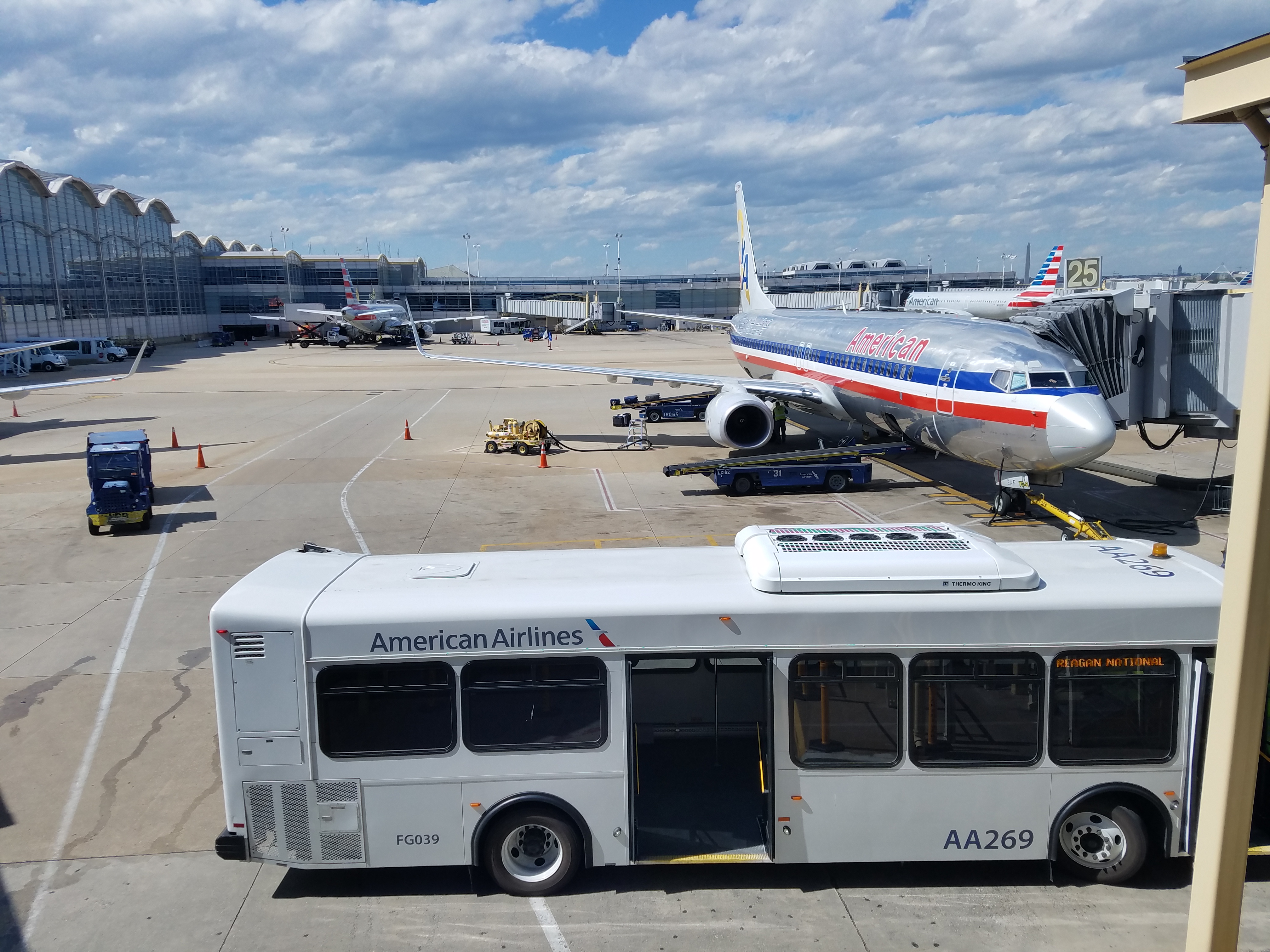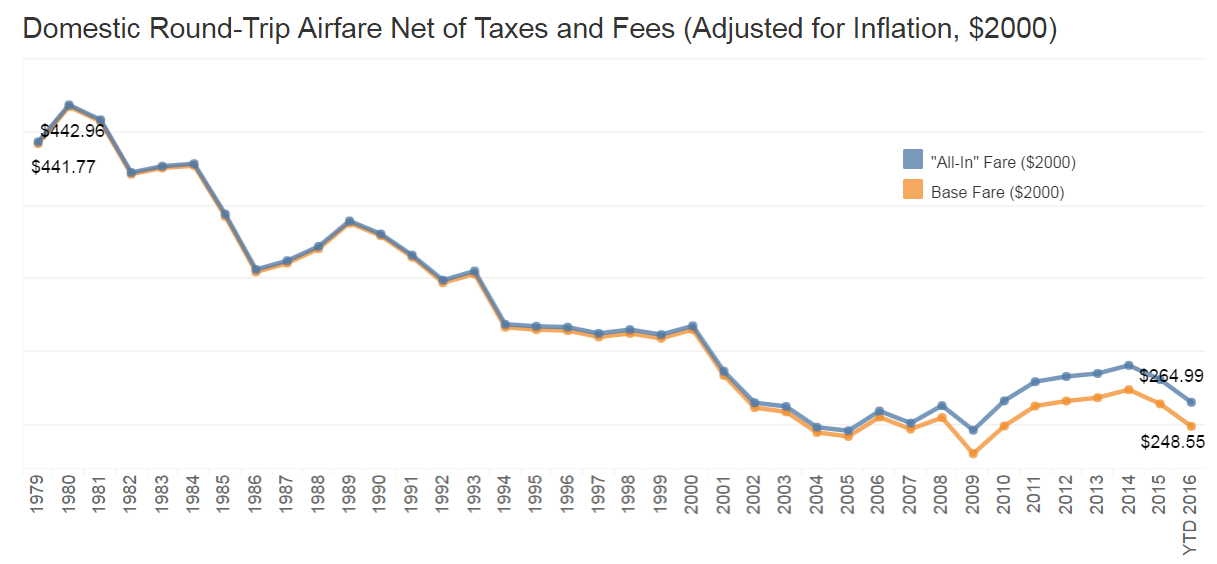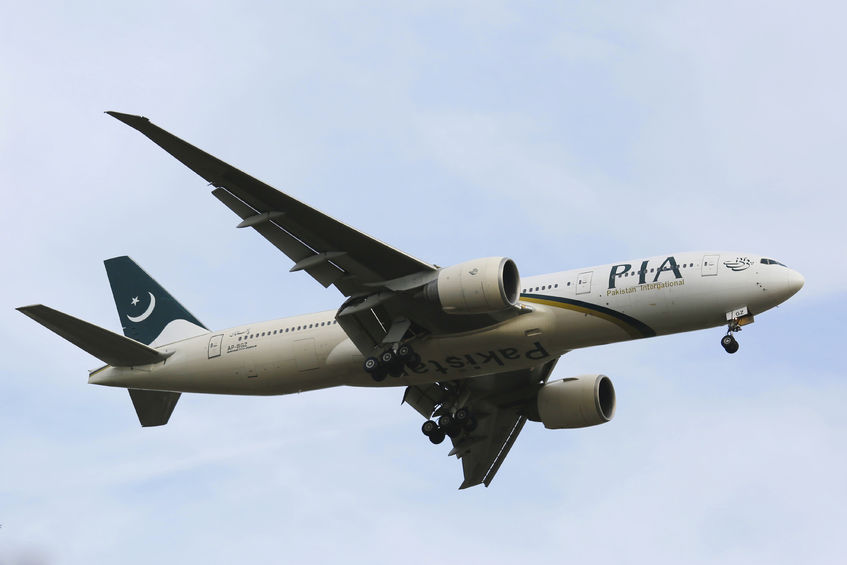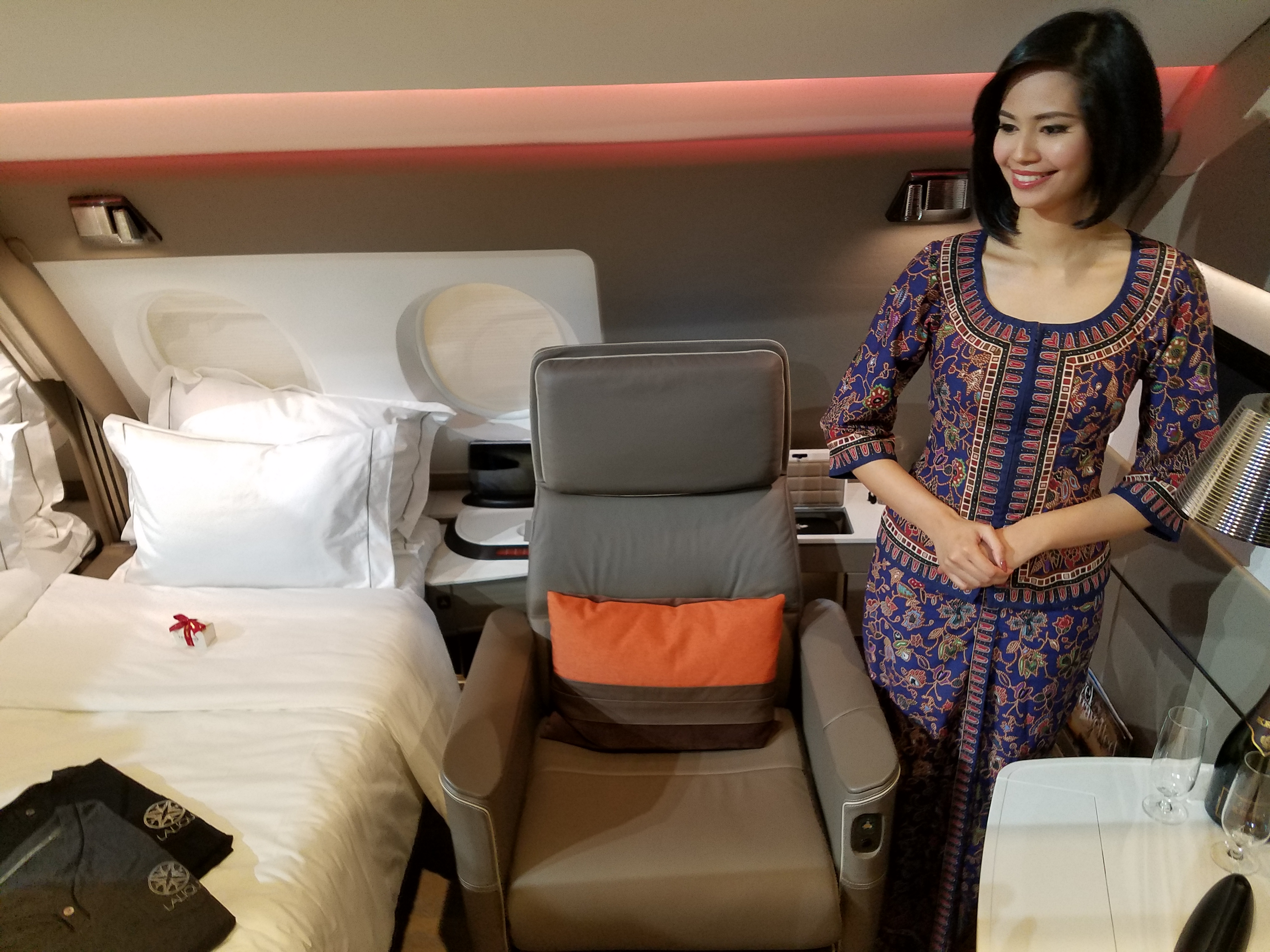The single nuttiest idea in aviation history was published in the Dallas Morning News, an argument by Matt Andersson, the founder of an airline startup (Indigo Airlines), to merge the nation’s airlines into one and have the government run it.
The gripes about the airline industry that should spur us to this action?
If it isn’t an act of God delaying flights, like weather, any number of other complicated variables can disrupt the smooth flow of operations. A maintenance problem, an air traffic control computer glitch, a crew scheduling snafu, a grounded airplane (like the 737 MAX), or a simple but disruptive problem like a broken passenger jet bridge, or one unruly passenger who has to be escorted off the plane by law enforcement, or a medical emergency that requires a diversion or special handling after landing.

There’s never any suggestion how a single national airline is going to solve weather, air traffic control computer glitches (in the U.S. air traffic control is already run by government), problems with the Boeing 737 MAX or disruptive passengers.
What’s more,
- Employees can strike
- Management can hurt employee morale
- Airlines can make bad decisions about their fleet, schedules, routes, pricing, and any number of other decisions
The airline industry is “among the most complex” and “the stakes are unforgiving” so let’s have government run it. Other than government employees not generally being permitted to strike, it’s not clear how government handles any of these complexities better. And the piece offers no suggestion of how it would either.
However there’s “one fundamental, overriding problem that keeps the airline industry in a constant state of disequilibrium” that nationalizing the industry and merging all airlines into one would solve. The author believes that problem is that there is too much competition.
Andersson acknowledges this “may seem counterintuitive or perhaps even absurd.” Why yes, yes it does. Yet for someone like him who believes that “market is so saturated with competitors and choices” and that it’s a bad thing when “no single firm can dictate price” you reach the conclusion competition shouldn’t be allowed and government should set prices — as they did prior to deregulation when the Civil Aeronautics Board dictated which airlines could fly specific routes and what prices they’d charge in order to prevent competition, keep prices high, and ensure airline profits.

Airfares Since Deregulation
Prices may not be high enough at some times, but Andersson also thinks they are too high for last minute business travel. One of the ways airlines maintain market power, he notes, is keeping out foreign competition — although he advocates less competition, not more.
Not only are prices too high and too low at the same time, service is bad, and we can be rest assured a government monopoly airline will provide better service – just like it worked in the good old days?
Aeroflot ad from 1970
Andersson fails to offer an example from around the world of a state-run airline he’s modeling this after. Instead he suggests airlines are like “any other mass-transportation system like a commuter rail or subway.” He must not have ridden New York’s subway system in recent years, or read federal reports on the safety problems at DC’s metro.
Since he says that “one thing is in short supply: imagination” it’s even harder to envision how an airline, run to service the objectives of politicians elected in a democracy, will become more imaginative.
The true challenge is that we have too few airlines there’s little opportunity for new entrants to engage in experimentation. We’ve seen mergers winnow down the field, and anti-trust immunized joint ventures winnow it down further on international routes as well, with huge impediments to starting a new airline (foreign airlines need not apply) and once started little opportunity to access gates and in some cases takeoff and landing slots at the most valuable – government owned and operated – airports in the country.
Instead of tackling the real problems in the airline industry, offering a model or plans to improve, he simply wants you to imagine getting everything you want and that’s government.
Imagine there were just one major airline, but it actually worked the way you want. This airline has regulated service standards (like comfortable seat pitch and shape), flat and predictable everyday fares like a commuter train, and a broad, comprehensive network. Can competition make it better than that? Not likely, unless you want to fly on a private jet.

State Airline on Approach to New York JFK in 2014, Copyright zhukovsky / 123RF Stock Photo
The problem is that one size fits all isn’t what we have, and we live in a world of tradeoffs. The notion that a government-run airline is going to “work the way you want” when different people want different things is silly.
The plan has two steps:
- Merge United, American, and Delta “eliminating or reducing duplication and waste” having fewer flights and less competition. Then give better “seat comfort and spacing, and fares.” Fewer flights, each with fewer seats, and all at lower prices, all while ensuring “reliable financial performance.” He says that “if airline executives were honest, most would be relieved.” But they’d be happier if they could deliver this product, make more money, and have a pony.
- Nationalize the entire industry making it “a pure public mass transit system.” Since the U.S. government already owns airports (unlike much of the world), and both regulates and runs air traffic control (unlike most of the work, and contrary to ICAO safety recommendations), why not just go all-in?

The Government Airline: Singapore Airlines A380 Seats, On-Time Operations, and Low Low Prices!
This way airline won’t have to “worry about in day-to-day operations” (although hopefully the government would hire people to do this?) and passengers wouldn’t have to spend time “search[ing] for a flight that is both affordable and likely to arrive on the day it is scheduled” (since they’d have no choices at all).
Indeed this “future of air travel is modern, technologically sophisticated, comfortable and humane, and with one standardized class of service — fast” just like every other state enterprise. Oh he wants to eliminate frequent flyer points, too.
This idea is even worse than Robert Kuttner’s nutty arguments for re-regulating the airlines.


Conveniently the Dallas Morning News is “currently revamping our comment section…” so Mr. Andersson can’t be publicly flogged for this obtuseness on their pages. Government is more broken than any industry, Matt, and consolidating power into the hands of a few always turns out poorly for the many. Competition is the solution, not the problem. Foster it and prices drop, amenities increase and overall experience improves.
I Can’t Believe Its Not Butter
Hey Andersson !
Why don’t you move to the USSR?
Oh that’s right, IT FAILED.
I Can’t Believe I Have to Write This Comment
Wow, 2020 cannot come too soon for this fella. Until the election, I suggest he become a frequent flyer on Aeroflot–not trans-Atlantic, but the interior flights they are so famous for running.
However, he could try taking multiple long distance train rides here where the federal monopoly known as Amtrak offers the same menu for every meal on every route. And oh yes, with no urgency to build revenues, the cafe car attendant is neither trained nor supplied to craft simple cocktails, such as Martini, Manhattan, Old Fashion, etc. As the dining cars are removed, only if this guy travels in a sleeper will he be served Amtrak’s version of a cold boxed meal in his room.
We do have that in another transportation industry. It’s Amtrak. Unreliable, slow as F, run mostly by the government. And compare ours to Europe’s and Asia’s versions. Why does he think it will work better here?
Reminds me of the despair quote: “Government. If you think our problems are bad, wait until you see our solutions!”
This guy is too stupid to be left alone.
Send this idiot to Venezuela for a month without toilet paper and he might start to get a clue.
God Almighty.
This “idiot” represents the general thinking of the republican, conservative imbeciles in red states, who want the health insurance they can’t afford but continue voting for politicians who do all they can to gut the few benefits left even further.
Sound familiar? “keep your government hands away from my medicare”
The eternal hypocritical republican position of privatizing their profits and socializing their losses…
Mr. Andersson needs to run for President as a Democrat so his fine ideas can be celebrated by the mainstream press. He should run on a platform that supports a green national airline run by undocumented immigrants posing as Native Americans that serves only cold meals to counteract global warming, forgives debt incurred for tickets, pays reparations for lost luggage, and considers it a terrorist threat to mention the letter NRA when flying over San Francisco. Heck, why should Democrats vote for a BLT or ham sandwich instead of Trump when they can vote for Mr. Andersson with Agent Smith as his running mate?
Obviously this is stupid. Maybe he is a troll? It’s hard to believe anyone would seriously suggest this.
Nationalization makes sense for certain essential services that cannot compete in the free market but are important for the future of the nation, such as the post office, and trains (as the rails are usually owned and maintained publicly, it makes sense for the government to run the train system- in Europe, in those countries where the trains are privatized, they have become terrible, whereas in countries with national train companies it works pretty well. Amtrak is actually pretty decent in some regions of the US – it’s just not a model that can work everywhere)
it is clearly not necessary in air travel.
If at some point air travel can no longer work as a free market, then we can talk about nationalization. However, at the moment all the existing problems of air travel can likely be solved with a combination of new regulation and technological innovation, which has been a winning approach (for consumers, not for the airlines) for decades.
In the alternate-history timeline of “The Man in the High Castle,” the Nazis developed a supersonic and efficient long-haul airline in the 1960s. Matt Andersson probably saw the show and wished that the Nazis had indeed won in WWII. He obviously hates freedom that much.
This guy purports to be an aviation consultant and former executive for a “startup”. His startup was one of those business jet for the masses deals.
I hate pieces like this. I work in this industry and know a thing or two about the operational side on how to get airplanes where they need to go on time (or not, as the case may be.) I am *always* interested in new ideas, because we always need to innovate. I’ll listen to anything.
Correction: I’ll listen to any coherent argument. This guy doesn’t even one. He needs to start out with a problem statement, explain why it’s bad, what his solution is, and how it improves the bad thing.
As a society, we have demanded low fares. If we look at Gary’s chart, it’s clear that net fares have decreased since deregulation. *Anything* we do to “improve” most things for the customer experience will increase fares, no ifs and or butts. (They’ll all have the net effect of reducing supply, which increases demand.)
I’m 6’1″ and not skinny. I need more space than a 5’2″ 120 lb woman. So Economy Comfort and First Class seats have more value to me than they do to her. Today, I have those choices at varying price points across multiple carriers. If this dude gets his way, do we all get first class seats and the fares that go with it, or do we all get coach and cheaper fares? I’m willing to pay extra for more space, and *I want that choice*. Today I get it. Additionally, I can pack for a weekend trip without checking a bag. If the airline is going to offer me a lower fare for not checking a bag, I’ll happily skip it and save the money. And when I need the bag, I pay.
Note to the regulatory-happy people out there: Markets set the price, no more no less. Airlines charge what people are willing to pay. Period.
What a complete MORON. Andersson is a classic dumdum who thinks he’s smart and writes articles to prove his low intellect. Why doesn’t he propose the same thing for the clothing industry that gives the consumer a billion choices? If he eliminates clothing choices our lives would be so much more simpler and think of all the money saved and the wonderful environmental impact this would have – this would be a real winner in Andersson’s mind.
What I would like to see is the government implement a passenger compensation for delays like the EU.
@Mark – Within Russia there are actually a few airlines competing.
It’s sickeningly funny to hear Republicans complain about how government doesn’t work after they’ve spent 40 years undermining it. Go figure. But but but Hillary’s e-mails… GMAFB
Mr. Anderson should travel back in time to USSR. In the Soviet times all airfares were fixed based on the distance flown. So the shorter flights were cheaper than the longer ones. Also, the prices did not change at all: not during the season and not when the ticket was purchased. So the last moment ticket did cost the same as the one purchased in advance. From what I do know the tickets would go on sale about 30 days before departure. I am sure all this sounds just wonderful to Mr. Anderson. But the most popular routes were sold out immediately or sold to the customers who would offer a bribe (i.e. the market was still working but only in a shade). Aeroflot was also flying some crap planes in single class configuration (at least domestically).
While I cannot offer a time machine for Mr. Anderson, perhaps, he should visit a DMV office to get the full experience of a service operated by a government monopoly. Or even better, next time he should enlighten us on how Amtrak is doing.
The Dallas Morning News comment section is broken! We need to nationalize all newspapers!
@Andrew Amtrak is not a good comparison, the rail infrastructure in the US has been neglected because of concerted and long term lobbying by the auto industry. If we actually prioritized and funded rail like Europe does it would not be in the state it’s in.
We can name the airline… (wait for it):
TRUMP AIRLINES
I’m still looking for the date of this. Must certainly be April 1.
Reading the article is ‘almost’ as entertaining as reading the comments here. What a dope he is, but sadly, all he has to do is keep shouting it loud enough and repeatedly and the collective IQ drops in large groups and next thing you know you have it. Good grief.
Would we like a consistent product? Sure! Heck I’d like consistency with AA’s fleet at this point! But the only way to make this work would be to eliminate all other airlines from flying here. Oh wait, we already do that domestically. Hmm.
Scary thoughts. Funny, but scary how some might jump on board.
@Nick – fair point. But then why did the California HSR fail? It was supposed to be all-new (and thereby immune from the concern you mention), but the government was too inept to budget, too inept to implement.
Still a bad idea, I think.
Gary
Please comment on your favorite travel writer’s absurd column this weekend on frequent flyer miles
Sadstate keep voting for socialist democrats and then pay MORE TAXES,Have MORE GOVERNMENT REGULATIONS,MORE TAXES,MORE ILLEGALS ADMITTED,LESS PERSONAL FREEDOMS AND AGAIN MORE T A X E S!!!Great ideas and HAVE GOVERNMENT TAKE OVER YUR HEALTH AND HEALTHCARE..FUN